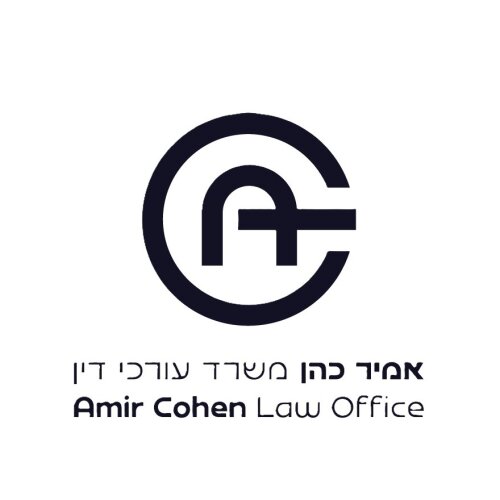Best Collaborative Law Lawyers in Israel
Share your needs with us, get contacted by law firms.
Free. Takes 2 min.
Free Guide to Hiring a Family Lawyer
Or refine your search by selecting a city:
List of the best lawyers in Israel
About Collaborative Law in Israel
Collaborative Law is an alternative dispute resolution method that emphasizes resolving conflicts through cooperation rather than litigation. In Israel, Collaborative Law has gained recognition as an effective way to manage disputes, particularly in family law cases, such as divorces. This approach involves both parties and their lawyers working together to reach a satisfactory agreement, utilizing open communication and negotiation techniques rather than adversarial tactics.
Why You May Need a Lawyer
Engaging a lawyer skilled in Collaborative Law may be necessary in various situations, including:
- Divorce negotiations, where a fair and amicable settlement is desired.
- Family disputes that require a non-confrontational approach to preserve relationships.
- Business conflicts where ongoing partnerships are valued and avoiding court is prioritized.
- Matters of inheritance where disputes may arise, and a collaborative solution is preferred.
Local Laws Overview
The application of Collaborative Law in Israel is supported by various local legal frameworks that encourage dispute resolution outside of traditional court settings. Key aspects include:
- The basic principle of collaboration that emphasizes negotiation and mutual respect.
- Legal requirements for disclosure, ensuring transparency and open communication between the parties.
- Court support in recognizing agreements reached through Collaborative Law, provided these comply with the legal standards.
- Implementation in family law cases as part of the broader movement towards alternative dispute resolution in Israel.
Frequently Asked Questions
What is Collaborative Law?
Collaborative Law is a legal process where parties involved in a dispute work alongside trained professionals to settle their issues cooperatively without going to court.
Is Collaborative Law legally recognized in Israel?
Yes, Collaborative Law is recognized and supported as a legitimate method of dispute resolution in Israel, particularly for family disputes.
What kind of disputes can be resolved through Collaborative Law?
While commonly used in family law, Collaborative Law can also be applied to business disputes and other conflicts where ongoing relationships are important.
How does Collaborative Law differ from traditional litigation?
Unlike litigation, which is adversarial, Collaborative Law focuses on cooperation and negotiation to achieve a mutually satisfactory resolution.
Do lawyers involved in Collaborative Law need special training?
Yes, lawyers typically require specialized training in Collaborative Law practices to effectively facilitate the process.
What happens if no agreement is reached during the Collaborative Law process?
If no agreement is reached, parties may pursue other means of dispute resolution, such as mediation or court litigation.
How long does the Collaborative Law process typically take in Israel?
The duration varies based on the complexity of the case, but generally, it is faster than traditional court proceedings.
Can Collaborative Law be used for cases involving child custody?
Yes, Collaborative Law is particularly effective in child custody cases, focusing on the best interests of the child through cooperative methods.
How do I know if Collaborative Law is appropriate for my situation?
Consulting with a lawyer experienced in Collaborative Law can help you determine if this approach suits your specific needs and situation.
What are the benefits of choosing Collaborative Law?
Benefits include cost-effectiveness, time efficiency, confidentiality, and fostering a cooperative spirit that can preserve relationships.
Additional Resources
For further assistance, the following resources can be useful:
- The Israel Bar Association offers guidance and a directory of lawyers specializing in Collaborative Law.
- The Ministry of Justice provides information on alternative dispute resolutions available in Israel.
- Professional organizations, like The Israeli Association for Collaborative Practice, offer resources and support.
Next Steps
If you believe you may benefit from Collaborative Law, consider the following steps:
- Research and contact a trained Collaborative Law lawyer to discuss your situation.
- Prepare to present your case details openly and discuss potential resolutions with your legal advisor.
- Plan for a cooperative approach, anticipating compromise and negotiation to reach a favorable outcome for all parties involved.
Lawzana helps you find the best lawyers and law firms in Israel through a curated and pre-screened list of qualified legal professionals. Our platform offers rankings and detailed profiles of attorneys and law firms, allowing you to compare based on practice areas, including Collaborative Law, experience, and client feedback.
Each profile includes a description of the firm's areas of practice, client reviews, team members and partners, year of establishment, spoken languages, office locations, contact information, social media presence, and any published articles or resources. Most firms on our platform speak English and are experienced in both local and international legal matters.
Get a quote from top-rated law firms in Israel — quickly, securely, and without unnecessary hassle.
Disclaimer:
The information provided on this page is for general informational purposes only and does not constitute legal advice. While we strive to ensure the accuracy and relevance of the content, legal information may change over time, and interpretations of the law can vary. You should always consult with a qualified legal professional for advice specific to your situation.
We disclaim all liability for actions taken or not taken based on the content of this page. If you believe any information is incorrect or outdated, please contact us, and we will review and update it where appropriate.
Browse collaborative law law firms by city in Israel
Refine your search by selecting a city.
















